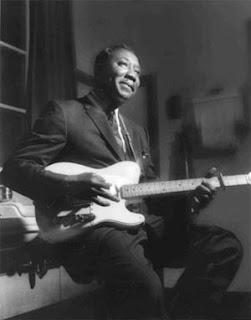
McKinley Morganfield was born in Rolling Fork, Mississippi on April 4, 1915. When he was just 3 years old, his mother died, so his maternal grandmother took over his care, and he moved the small town of Clarksdale, about 100 miles north of his hometown.
Muddy Waters learned how to play the harmonica when he was 13, and the guitar at the age of 17. His early influences were Son House, and Robert Johnson. He loved the sound of the "Bottleneck" style of guitar accompaniment. With this style, he could utilize the guitar as an extension of his voice, using dips and sliding notes. Working on a local plantation, he made a name for himself locally as a musician and a moonshine bootlegger.
In 1941, he cut his first record for the Records Library of Congress Folksong Archives. The team was headed by Alan Lomax, who was responsible for rediscovering many great blues artists who were virtually unknown to white audiences. Muddy Waters recorded for him for 2 years.
In 1943, Muddy Waters moved to Chicago, under the wing of Big Bill Broonzy. It was here that Waters got his first electric guitar. Life wasn't as easy for him as he suspected. He played at house parties, and small clubs before he got his first chance to record. His first recordings were with Columbia Records, but, unfortunately, the recordings weren't issued until 1971.
In 1948, He cut some unsuccessful records under the Aristocrat label. Two years later, he signed with Chess records, and scored a hit with the single "I Can't Be Satisfied/I Feel Like Going Home". In less than a day, the record's entire stock had been sold.
What followed from 1951-1960 were probably the greatest collection of electric blues recordings ever made. Waters' songs like Mannish Boy and Long Distance Call were accented by songs Willie Dixon had given him like Hoochie Coochie Man, and I Just Want to Make Love To You. These records defined the Chicago Blues sound during this period.
In 1958, he released The Best of Muddy Waters. It was a collection of his hit singles. That same year, he toured England. It was a huge success, and worked well to broaden his audience. For his next album, he interpreted a collection of Big Bill Boonzy songs to take advantage of his new audience who seemed to like the acoustic blues over the heavily riveting electric style for which he was known.
In 1960, Muddy Waters turned the NewPort Folk Festival into a blues bash. The band was at their best, and played a feverish set on the Newport stage. A year later, Chess released the live version Muddy Waters at Newport.
In the continuing push to sell Waters as a folk-blues artist, he released another album in 1964 entitled Folk Singer, which drew much success. In the late 60's and early 70's, he released several more successful albums. One of which, entitled Fathers and Sons, was a album which paid homage to his achievements by featuring several young artists who had learned directly from him, and repaid the favor by using their celebrity status to focus on him. The album They Call Me Muddy Waters won him a Grammy for best ethnic/traditional recording in 1971.
Throughout the 70's, Waters toured almost constantly all over the world. By 1977, he ended his longstanding relationship with Chess records, and signed with BlueSky with the unwavering devotion of producer/guitarist Johnny Winter. His first album under the new label Hard Again, won him his second Grammy. In 1978, he released another album I'm Ready, which was also a critical success. He then toured the U.S. and made a special performance at the White House for President Jimmy Carter and his staff.
Waters released two more albums after that, Muddy "Mississippi" Waters Live and King Bee, and still constantly toured to the delight of devoted fans. But on April 30, 1983, quietly in his sleep, Muddy Waters passed away of a heart attack in his home in Westmont, Illinois.
Muddy Waters was the Patriarch of Chicago Blues. His mastery of the slide "bottleneck" style earned him his place as one of the greatest electric blues Legends of his time. He was also a compelling songwriter and stage performer. He single handedly reshaped the course of the blues, and influenced others who followed in his wake.

0 comments:
Post a Comment